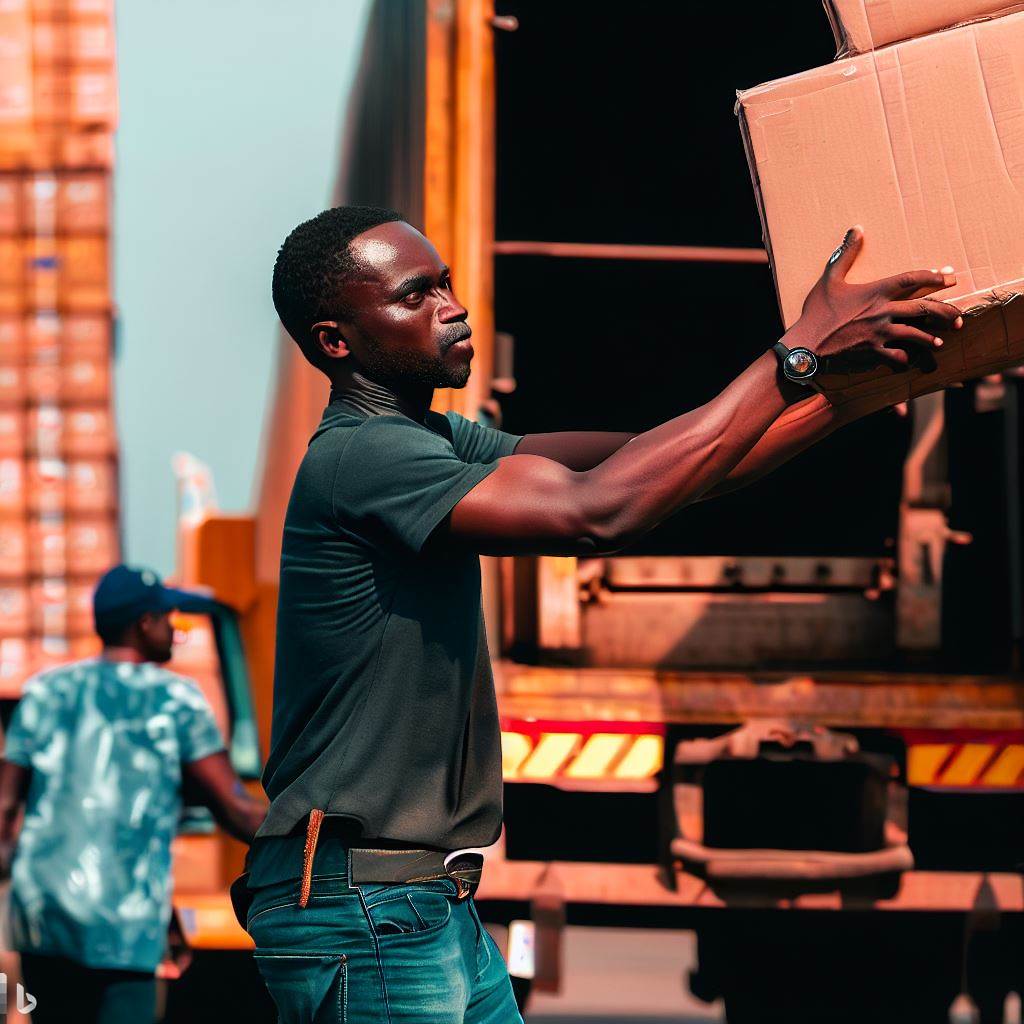Introduction
In the world of global transportation, Nigerian professionals have made significant contributions.
Their accomplishments span various organizations, including the International Maritime Organization (IMO), the International Civil Aviation Organization (ICAO), and the World Trade Organization (WTO). These professionals have been instrumental in shaping policies and regulations that govern the movement of goods and people across the world.
Global transportation bodies are international organizations with the mandate to regulate and oversee transportation activities on a global scale. They include the IMO, ICAO, International Road Transport Union, and the WTO.
These bodies play a critical role in ensuring the safe, efficient, and sustainable transportation of goods and people across borders. They develop and enforce policies, provide technical assistance to member states, and facilitate cooperation amongst member states.
The significance of Nigerian professionals in these organizations cannot be overstated. They bring a unique perspective and expertise to the table, representing the interests of Nigeria and the African continent.
Their achievements have been recognized globally, and they have played a vital role in shaping the future of global transportation. As Nigeria continues to be a major player in the global transportation sector, the contributions of these professionals will only become more critical.
Overview of Nigerian Professionals in Global Transportation Bodies
Nigeria has a rich history of producing professionals who have excelled in the global transportation industry.
From the early days of aviation to modern shipping, Nigerians have made significant contributions to the development of transportation systems worldwide.
Today, Nigerian professionals can be found in key positions in several global transportation bodies, such as the International Maritime Organization (IMO) and the International Civil Aviation Organization (ICAO).
Historical background on the involvement of Nigerians in global transportation bodies
Nigeria’s involvement in global transportation bodies dates back to the early years of aviation, with the likes of Ade Akinsanya, the country’s first commercial pilot.
Since then, Nigerians have continued to make significant contributions to the development of the global transportation industry, including notable figures like Capt. Josiah Jesse, who became the first African to fly across the Atlantic Ocean in 1964. The country’s involvement in international transportation organizations began in 1961 when Nigeria joined the International Civil Aviation Organization as a member state.
Since then, Nigeria has actively participated in the organization’s activities, including serving on its Council.
Nigeria also played a major role in the establishment of the African Civil Aviation Commission in 1968, which serves as an umbrella body for civil aviation organizations in Africa.
Current statistics and significant representation of Nigerians in these organizations
Today, Nigerian professionals are well represented in several global transportation bodies.
One of the most significant is the International Maritime Organization (IMO), where Nigeria has been a member since 1962.
At present, Nigeria has two representatives on the IMO Council, and several other Nigerians serve as technical experts and consultants. Nigeria has also been a member of the International Transport Forum (ITF) since 2007.
Furthermore, the Nigerian government has made efforts to increase the representation of Nigerians in these global transportation bodies.
In 2019, the Minister of Transport, Rotimi Amaechi, called for greater participation of Nigerian professionals in IMO activities, and the government has also allocated funds for training programs to improve the skills of Nigerian professionals in the transportation sector. Nigerian professionals have played an important role in the global transportation industry and are well represented in several key organizations.
The country’s rich history and tradition of excellence in transportation have led to the emergence of several world-class professionals who are making significant contributions to the development of the industry.
By continuing to support the development of transportation professionals and encouraging greater participation in global transportation bodies, Nigeria can build on its successes and continue to make significant contributions to the transportation industry.
Read: Travel Writing in Nigeria: Turning Trips into Profit
Key Nigerian Professionals in Global Transportation Bodies
Nigeria, a country with over 200 million people, has produced prominent professionals across different industries, including transportation.
These individuals have gone on to make significant impacts in global transportation bodies, showcasing Nigeria’s talent and expertise in the industry.
In this chapter, we’ll highlight some of these key Nigerian professionals and their achievements in global transportation bodies.
Dr. Harold Demuren
Dr. Harold Demuren, a Nigerian aviation expert, directed the Nigerian Civil Aviation Authority (NCAA) from 2006 to 2013.
He served as the President of the African Civil Aviation Commission (AFCAC) and as a member of the International Civil Aviation Organisation (ICAO) Council.
Dr. Demuren spearheaded safety and security measures in Nigeria’s aviation industry, earning global recognition and respect from aviation experts.
Folake Ademola Odeyemi
Folake Ademola Odeyemi is a Nigerian engineer who has made great contributions to the field of transportation.
As the first African to serve as Assistant Secretary-General of the International Maritime Organization (IMO), Odeyemi heads the Legal Affairs and External Relations department.
She consistently advocates for improving maritime transport in Africa, especially promoting gender equality and marine environment protection.
Bisi Adeyemi
Bisi Adeyemi, a Nigerian transport and logistics expert, served in multiple roles in the International Air Transport Association (IATA).
She led IATA’s African Regional Operations and now serves as Regional Director for Africa and the Middle East.
Adeyemi’s leadership fostered African aviation industry development, and she advocates for productivity and competitiveness enhancements.
Emmanuel James
Emmanuel James is a Nigerian transportation planner and specialist who has made an outstanding impact in the field of transportation.
He is the current Deputy Director of the Division for Sustainable Development Goals (DSDG) in the United Nations Department of Economic and Social Affairs (UNDESA).
James is responsible for coordinating and leading the development of policies and programs that promote sustainable transport globally.
He has also been involved in various projects aimed at reducing emissions from transport, promoting sustainable energy, and improving urban mobility.
Tonye Cole
Tonye Cole is a Nigerian businessman and entrepreneur who has contributed significantly to the oil and gas and transportation industries.
He is the co-founder and Group Executive Director of Sahara Group, a leading energy and infrastructure company in Africa. Cole has also been involved in developing and implementing various transportation and infrastructure projects across Africa and the Middle East.
He is a member of the United Nations’ Private Sector Advisory Group for Sustainable Development Goals.
Nigerian professionals showcased expertise and talent in global transportation, from aviation to maritime, logistics, and sustainability. Their achievements inspire upcoming professionals and advocate sector growth in Nigeria and beyond.
Read: Nigeria’s Air Traffic Controllers: Roles and Careers

Challenges Faced by Nigerian Professionals in Global Transportation Bodies
Nigeria, like many other developing countries, faces a range of challenges in its quest to assume a more prominent role in global transportation.
These challenges are even more accentuated for Nigerian professionals who aspire to serve in various global transportation bodies.
Here, we will highlight some of the challenges Nigerian professionals face in global transportation bodies and explore ways to address them.
Identification of Issues Nigerian Professionals Face in Global Transportation Bodies
- Cultural Differences: Nigerian professionals often face cultural differences while serving in global transportation bodies, which can be challenging to overcome. They may struggle to adapt to different social norms, customs, and communication styles.
- Language Barriers: With over 250 languages spoken in Nigeria, language barriers can be a significant obstacle for Nigerian professionals when working in global transportation bodies where English is the predominant language of work. They may struggle to express their opinions or understand others during meetings or discussions.
- Limited Exposure: Nigerian professionals often have limited exposure to the latest ideas and innovations in transportation due to limited resources and funding, which can put them at a disadvantage in global transportation bodies.
- Lack of Skills and Experience: Many Nigerian professionals face a lack of relevant skills and experience, particularly in emerging fields like artificial intelligence, which are essential in modern transportation. This can undermine their effectiveness and limit their contributions to global transportation bodies.
- Geopolitical Tensions: Lastly, Nigerian professionals may face geopolitical tensions in global transportation bodies due to Nigeria’s position in the global political landscape. These tensions could result in unfair treatment and discrimination, placing Nigerian professionals at a disadvantage.
Discussion on How These Challenges Can Be Addressed and Overcome
Some ways to address the challenges faced by Nigerian professionals in global transportation bodies could include:
- Cultural Training: Nigerian professionals could undergo cultural immersion training to better understand the customs, norms, and communication styles of other cultures. This could increase their chances of successful collaboration and communication in global transportation bodies.
- Language Support: Language support could be provided to Nigerian professionals with limited English proficiency, such as providing language classes, translation services, or assigning a language buddy to help them express their opinions confidently and understand others’ contributions during meetings and discussions.
- Increased Exposure: Nigerian professionals could gain more exposure to the latest ideas, technologies, and innovations in modern transportation through attending international conferences, seminars, and workshops. This could help them share practical solutions and best practices with global transportation bodies.
- Skills and Experience Development: Nigerian professionals could benefit from increased access to skill-building opportunities, internships and mentorships, and advanced coursework. These opportunities could prepare them for emerging fields and improve their chances of effective participation in global transportation bodies.
- Advocacy: Nigerian professionals in global transportation bodies and their supporters could engage policymakers and stakeholders at national, regional, and international levels to discuss and address geopolitical tensions. This could help create a more favorable environment for Nigerian professionals to participate and contribute to global transportation bodies fairly.
Nigerian professionals, similar to peers in developing nations, encounter challenges in global transportation bodies. Identifying issues and implementing solutions enables meaningful contributions.
Read: Green Jobs in Nigeria’s Travel and Transport Sectors
Promoting the Representation of Nigerian Professionals in Global Transportation Bodies
Nigerian professionals’ representation in global transportation bodies is crucial for sector growth and development. They offer valuable expertise but face limited representation, hindering policy influence.
Importance of promoting Nigerian professionals’ representation in global transportation organizations
Promoting the representation of Nigerian professionals in global transportation organizations is vital for several reasons:
- It provides a platform for Nigerian professionals to contribute towards the development of policies and initiatives that impact global transportation
- It enables Nigerian professionals to gain exposure to global best practices and exchange knowledge with other professionals in the sector
- It enhances Nigeria’s reputation as a knowledgeable and competent player in the global transportation sector
- It can lead to increased investment in Nigeria’s transportation sector, as investors are more likely to invest in countries that have a strong presence in global transportation bodies
Steps taken by the Nigerian government and other stakeholders in boosting representation
The Nigerian government and other stakeholders have taken several steps towards promoting the representation of Nigerian professionals in global transportation bodies:
- Establishment of relevant professional bodies: The Nigerian government has established professional bodies such as the Chartered Institute of Logistics and Transport (CILT) and the Nigerian Institute of Transport Technology (NITT) to promote the development of the transportation sector and provide a platform for Nigerian professionals to advance their careers.
- Collaboration with global transportation organizations: The Nigerian government has entered into partnerships with global transportation organizations such as the International Maritime Organization (IMO), the International Civil Aviation Organization (ICAO), and the World Bank to strengthen Nigeria’s representation in these bodies and enhance its participation in global transportation initiatives.
- Provision of training and capacity building: The Nigerian government has provided training and capacity building programs for Nigerian professionals in the transportation sector to enhance their skills and knowledge and prepare them for leadership roles in global transportation bodies.
- Encouragement of private sector participation: The Nigerian government has encouraged private sector participation in the transportation sector and created a conducive environment for private sector investments in the sector. This has increased the number of Nigerian professionals in the transportation sector and improved their representation in global transportation bodies.
Nigerian professionals must be represented in global transportation bodies for growth and development.
They contribute to policies, gain exposure, enhance reputation, and attract investments. The Nigerian government and stakeholders must sustain efforts.
Read: The Role of Transport Planners in Nigeria’s Future
Conclusion
Throughout this article, we have explored the significant contributions of Nigerian professionals to global transportation bodies.
We have highlighted the outstanding skills and expertise of these professionals who have made a name for themselves by making remarkable strides in various sectors of the transportation industry across the globe.
Nigerian professionals in transportation deserve representation in global bodies. Let’s create enabling environments, advocate their participation, and celebrate their contributions.
Their achievements have been recognized globally, and they have played a vital role in shaping the future of global transportation. As Nigeria continues to be a major player in the global transportation sector, the contributions of these professionals will only become more critical.In essence, Nigerian professionals in global transportation bodies are essential players in the world of transportation. Their contributions have helped shape policies and regulations that have made transportation safer and more efficient.




